Draft Enfield Budget would hike levy near 8 %
Levy increase more than 2.5x Tax Cap; Highway pay would rise 12%
by Robert Lynch, September 28, 2022
Times have changed in Enfield budgeting. Two years ago, former Town Supervisor Beth McGee darned near starved the Enfield Highway Department. McGee pushed through her Town Board a budget that cut Highway staff by one and denied those who remained on the job any raise in pay.
But this Wednesday night, McGee’s successor, Stephanie Redmond, presented her Town Board a much-different spending plan. Redmond’s Tentative Budget—subject to Board refinement at future meetings—would grant both Highway Superintendent Barry “Buddy” Rollins and his four workmen raises of 12 per cent or more. The size of the proposed increase surprised some Board members.

The Highway raises came as part of Redmond’s proposed nearly $2.5 Million combined Town and Fire Protection District 2023 Tentative Budget, a spending plan that would raise $2.115 Million in taxes, up 7.78 per cent from the current year’s budget. The increase is 2.66 times the state’s largely-symbolic 2.92 per cent tax cap.
If the largely-contractual Fire Company budget is ignored, the increase is even greater. The levy attributed to General and Highway Fund expenses would rise by over 11 per cent.
Enfield Highway Department salaries are “significantly below surrounding municipalities,” Redmond told her Town Board at Wednesday’s Special Meeting, where she made her proposal public. It’s “fair” to do this, she said of the 12 per cent raises. “We could have retention problems if we did not do this.”
The Enfield Highway Department is already down one worker.
By contrast to the Highway salary increases, Redmond’s Tentative Budget provides only a two per cent pay raise for most other Town employees, including the Town Clerk/Tax Collector, Town Board members, and for the Supervisor, herself.
Under the proposed spending plan, Highway Superintendent Rollins’ annual salary would jump from $64,000 to $71,680. By contrast, Town Clerk/Tax Collector Mary Cornell, technically only part-time, would earn only $32,640, up $640 over the year.
Rollins has benefits, like health insurance. Cornell does not.
Town Board members said little about the budget during Wednesday’s session, preferring to save their comments for another special meeting they’ve set for October 7th. In part prompting their hesitancy, members first wanted a legal opinion on whether state law requires discussion of employee rates of pay in open session or whether members can ponder them behind closed doors, as Redmond said she’d prefer.
“I think we need to address the equity issues underlying these divergent increases,” Town Councilperson Robert Lynch (this writer) said after Wednesday’s meeting. “Of course, every employee deserves higher pay” Lynch added. “But we’ve got a proposed budget here with a double-digit rise in the Town-controlled tax levy. We must consider that, too.”
At the start of Wednesday’s session, Lynch read a letter from Dennis Hubbell, President of the Enfield Volunteer Fire Company (EVFC), requesting that the Town honor the Fire Company’s request for a $25,000 additional appropriation to cover purchase of so-called “Turnout Gear” for volunteer firefighters.
In quarterly meetings between EVFC officials and Town Board members during recent months, Hubbell had pushed for the $25,000 supplement to the Town’s otherwise-contractual obligation to the company so as to cope with other cost increases impacting the EVFC. Redmond’s Tentative Budget did not include the $25,000 appropriation.
Disclosing that a new Fire Engine is likely to be delivered sooner than first thought and that its financial underwriter has expressed concerns about the apparatus’ increased cost, Hubbell wrote the Board that the underwriters “would feel much more comfortable” if the turnout gear money were approved, and that the appropriation “would make things go a whole lot smoother, I believe.”
Now, the EVFC President must await the outcome of further Board discussions.
We had “almost a Half-Million Dollars in asks,” Redmond told the Board Wednesday regarding departmental submissions for increased spending. Those requests were “all valid and necessary, but impossible to meet,” she said.
In past years, Redmond, like her predecessor, McGee, has regarded New York’s administratively-calculated tax cap—notoriously oblivious to real-world inflation—as the Holy Grail of town budgeting. At meetings during the McGee era, fingers would fly across calculators to tweak a budget so as to fall just within the cap’s precision. But this year, the Supervisor admitted she gave up hope of ever holding the tax levy within the cap’s constraints.
“I did what I thought was fair,” Redmond said.
One factor that evades the Albany bean-counters’ attention would make this year’s exceeding the State’s tax cap much easier for the Town Board to justify. Enfield this year built a new salt and sand storage shed. And its projected financing cost adds $47,500 to the General Fund’s spending line.
Salt barn debt service cost this year is a “guesstimate,” Town Bookkeeper Blixy Taetzsch warned. Taetzsch assisted Redmond extensively in the budget’s preparation. The financing right now is temporary; permanent bonds for the project won’t issue until sometime next year. Taetzsch based her calculation on a best-guess bonding rate of 4.5 per cent.
“Who knows what that rate is going to be?” Councilperson Lynch cautioned, noting that the Federal Reserve is continually increasing interest rates in attempts to slow the inflationary economy.
In part to address bonding cost volatility, Lynch suggested the Town increase its contingent fund beyond the $20,000 Redmond had budgeted. The $20,000 contingent fund would be the same as for the present year.
Though the Tentative Budget’s General and Highway Fund tax levy would rise by 11 per cent, Enfield, like Tompkins County as a whole, would wash out all of that increase on next year’s tax bills thanks to rapidly-increasing property assessments.
Since the Town’s tax base has risen by as much as 16 per cent over the year—mostly due to the reassessment of existing properties—the projected non-fire tax rate included in the Supervisor’s budget would actually fall by 4.28 per cent for that portion of the bill devoted to General and Highway Fund expenses. The fire rate would fall by even more.
Supervisor Redmond’s Wednesday release of her 2023 Tentative Budget stands as only the first step in the Town’s state-mandated, multi-stage annual budgeting process. After Town Board review and possible revision, the Board must elevate the Tentative Budget to a “Preliminary Budget.” In Enfield’s case, such a vote could come as soon as mid-October. Next, the Board must hold a Budget Hearing by November 10. It must then adopt the resulting “Final Budget” by late-November.
Back in 2020, Beth McGee adopted a budget much sooner, hers on the last day of September. Then she resigned that same night. That was then.
###
The end of County Redistricting’s twisting journey
by Robert Lynch, September 25, 2022
By this writer’s count, the Tompkins County Independent Redistricting Commission held a dozen meetings—its first one last December 14th, and the most recent one in late August. Its singular mission was to re-divide districts for the Tompkins County Legislature. It took on the task to satisfy the Supreme Court’s long-standing one-person, one-vote mandate as well as New York State’s now even more stringent criterion, one twice as rigid as what SCOTUS demands.
The Commission had to deal with “45 Rubik’s Cubes at one time,” legislator Deborah Dawson famously remarked during a redistricting discussion in July.
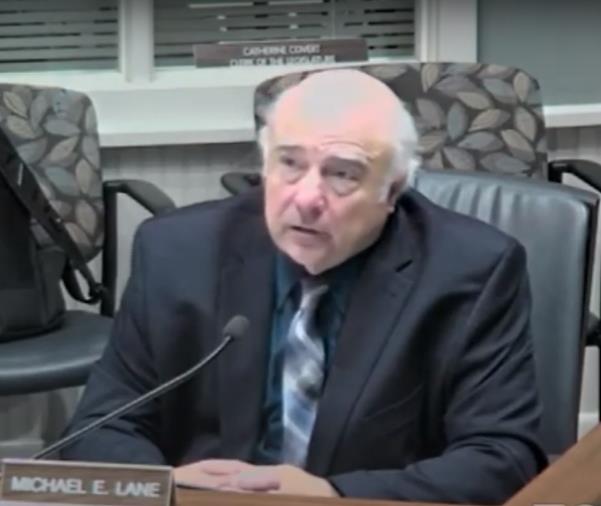
The Commission did its job. But the wide latitude given it by the Tompkins County Charter also empowered the citizen board to recommend changes in the number of county legislators. It could also decide whether that number would be odd or even.
It was those two questions that proved the sticking points this year. And it explained why a bare majority of the current 14-member Legislature this summer tossed the Commission’s first submission back to it for a revisit. The Commission liked what it first tendered and tossed its recommendation back to the Legislature unchanged. Grudgingly or not, the Legislature last Tuesday ratified the Commission’s first and only line-drawing submission. Frankly, as the Charter stands written, the Legislature had little choice.
“I can’t say I agree with the outcome,” said Dryden legislator Mike Lane, for much of this year the redistricting proposal’s most ardent critic. “But that’s the way it works.”
“When you share power, which is what we have done here, instead of keeping this as our own decision as most counties do, I think sometimes you end up with things that you didn’t expect or may be better or may not be better.”
The County Legislature’s membership is an even number now. The Commission’s plan would keep the number even, yet still increase it by two, raising membership to 16. Commission members have maintained that nothing else really worked. State law currently permits only a five per cent population deviation between the smallest district and the largest. And any different headcount, Commission members argued, wreaked havoc with keeping communities—including Enfield and Newfield—from being chopped to bits.
Enfield has been, and will continue to be, split between two legislative districts. At least one alternative map would have increased the Enfield district number to three. Newfield has traditionally enjoyed representation by just one legislator. Some alternatives considered this year would have split Newfield; often joining the town’s eastern side to a district centered in Danby. And for Enfield, one considered redesign would have removed southern Enfield from the Newfield district now represented by Randy Brown and given it to the Town of Ithaca district served by Amanda Champion.
Nonetheless, a couple of latter submissions—one for a 13-member Legislature, and another for just 11 members—would have combined all of Enfield into a single district, merging it with Anne Koreman’s Ulysses district.
The Commission tossed aside all of the competing options, holding firm to its 16-member favorite, one that really wouldn’t change either town’s representation much at all until the next decade. Mecklenburg Road, Route 79, will remain, with some changes, the rough dividing line between Brown’s district and Koreman’s. Barring an unexpected court challenge, voters will not witness the change until the next legislative election in 2025.
Unlike in many other places and in a transparent attempt to insulate line-drawing from gerrymandered political manipulation, Tompkins County’s Charter gives the Commission, not the County Legislature, the final say. Lawmakers can only seek Commission reconsideration once. Barring a lawsuit, last Tuesday’s acceptance was something lawmakers couldn’t avoid. Still, two legislators voted against the Commission’s proposal. Newfield-Enfield’s Randy Brown was one of them.
“I think it’s a waste of money, Brown said of the Commission’s 16-member recommendation. “I don’t see the value in adding two legislators.”
Brown also argued that by the time the redistricting plan actually gets implemented, it’ll already violate New York’s equal-population mandate, even though the law may be blind to that flaw.

“I think that you’re going to find that by 2025, the five per cent (requirement) is going to be out of whack right away, and we’re going to be dealing with that for ten more years after that,” said Brown. “I don’t think it’s fair.”
In reality, the time frame may become more like eight years, as the 2030 census could be employed for legislative elections in 2033.
Ithaca’s Henry Granison, African-American, provided Tuesday’s other objection to the redistricting plan, but declined to explain his vote. The Legislature’s second person of color, Travis Brooks, could have been expected to join Granison in objecting, but didn’t. Though he voted to affirm the plan, Brooks took aim at the proposal’s racial impact. He said that the plan, intentionally or not, would pack low income residents and minorities into a single City district, namely his.
“To me,” said Brooks, “we did the opposite of what we’re supposed to be doing, and we disenfranchised the minority voices even more by putting all low-income housing in one district. That’s giving one vote for minority, low-income folk in the county.”
Shortly after Brooks said those words, others prompted him to walk them back. One-by-one, legislative colleagues piled on to note that their districts, too, have at least some low-income housing.
But Brooks viewed the issue more broadly. And his argument took one side in a redistricting debate that’s confounded many in this nation for decades. Does one advance minority interests by consolidating communities of color and thus insuring that the sub-group elects at least one of its own? Or are ethnic groups better served by splitting minority members among several districts, thereby giving them a less-probable, though still viable option to elect multiple representatives?
****
The Tompkins County redistricting debate may not be settled. Twists and turns may remain. Legislator Lane, having lost his earlier effort to shorten current legislative terms so as to implement the 2020 Census data sooner, may yet move to implement weighted voting in the County Legislature for the years before 2026. And looking longer-term, Lane hinted Tuesday that Tompkins County may want to curb the Redistricting Commission’s future power in determining legislative numbers, and permit it only to define those districts’ shape.

“Probably we need to look at the criteria that we suggest to the Independent Commission in the Charter again… not tomorrow, but we need to do it eventually,” said Lane. He did not get more specific.
Mike Lane dislikes tie votes. Multiple times during the redistricting debate, he’s resurrected the protracted leadership stalemate of 2020, when legislators tied seven-seven in repeated votes during successive meetings before finally deciding upon a permanent Chair. Lane also argues Tompkins County, by its latest action, has bucked a regional, if not national trend.
“I think we probably will be the only county that…will be going up in the number of legislators,” Lane said. “Most counties are going down.” And about those other legislatures, he added, “I don’t know how many have an even number of legislators. I would be surprised if there are very many.”
“The problems we have seen in the past will arise because there will be divided votes, 50/50,” the Legislature’s most senior member warned.
By 2026, Lane cautioned, as many as nine people will be needed to pass a resolution in the Legislature.
[Full disclosure: This writer’s sister, Marcia Lynch, sat this year on the Independent Redistricting Commission; and this writer has spoken multiple times, to both the Commission at the County Legislature, in favor of the redistricting proposal adopted.]
In other action at the Legislature’s September 20th meeting:
- With little advance notice, the Legislature adopted member Deborah Dawson’s last-minute Resolution extending a multi-year financial agreement between the County, the City of Ithaca, and Cornell University for the operation of the TCAT transit service. Discussion prior to the unanimous voted skirted two hot-button TCAT controversies; namely whether transit ridership should become fare-free for all, and whether Cornell should increase its subsidies.
- The Legislature, with little discussion, authorized an increase the in partial property tax exemptions granted senior citizens and the disabled. Under its action, the maximum income for a 50 per cent reduction in County—but not Town, City, or School—taxes would rise from $29,000 to $35,000. The Enfield Town Board will consider its own possible exemption eligibility increase in future weeks.
- Meanwhile, Government Operations Committee Chair Amanda Champion pulled a committee-debated proposal that would have moved Tompkins County from a one-year to a three-year reassessment cycle. Champion gave no explanation for her action.
###
Chair Black Defends P.R. Chief amid 1st Amendment Flap
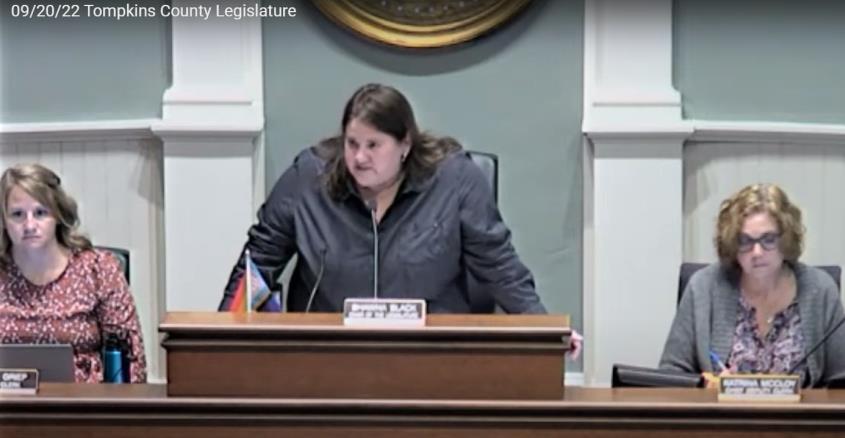
Analysis by Robert Lynch, September 23, 2022
This week’s comments by the Chair of the Tompkins County Legislature made one point perfectly clear: To some in County Government, the most politically incorrect thing you can do is to criticize the City-County Reimagining Public Safety collaborative.
And Shawna Black’s provocative statement September 20th underscored yet a second point: The only person likely to pay a price for what now might be called “Rordangate” is one poorly-paid, bottom-rung—and now, unemployed—community journalist who had the audacity to report what the mayor of Trumansburg actually, candidly had told her.
“Recently there have been defamatory and uninformed accusations made against our County Communications Director related to his relationship with the local press,” Chairwoman Black stated Tuesday night before the County Legislature in defense of Dominick Recckio, the governmental spokesman that Ithaca Alderperson Jeffrey Barken has accused of “exercising improper influence” over a local weekly newspaper’s reporting of Reimagining-critical comments uttered by Trumansburg Mayor Rordan Hart.
“Reimagining Public Safety is an investment in better, more transparent, and more equitable way of policing,” Shawna Black insisted, continuing with her rambling, defensive, nearly 700-word monologue that most observers would find not in her character. Reimagining Public Safety, Black maintained, is “an investment in finding ways to meet our community’s increasing needs while freeing up law enforcement officers to handle serious and criminal issues. It is not an anti-police or defund the police measure.”
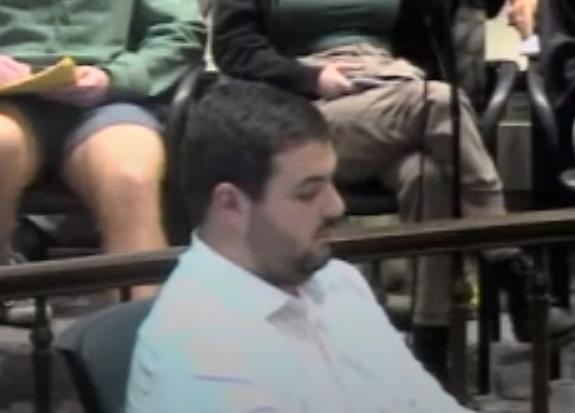
Still, in some way or another, the otherwise-innocuous August third profile of Mayor Hart reflecting upon his village’s 150th anniversary cost reporter Deidra Cross her job. Following Recckio’s pushback on the alleged “inaccuracies” concerning Hart’s embedded comments on Reimagining, Cross’s employer, Tompkins Weekly, terminated her.
In what most would regard as little more than a hometown puff-piece about a village’s youngest-in-a-half-century mayor, Cross never got to Hart’s criticism of Ithaca’s policing reforms or its impact on T-Burg until her eighth paragraph. Had Recckio not become involved in the matter or had Barken not faulted him for doing so, probably few would have noticed.
For its part, according to media quotes, Tompkins Weekly executives minimize the causal connection between the story and the firing. And they downplay Recckio’s role in all of it.
The Ithaca Voice quotes Tompkins weekly editor Jessica Wickham as saying the termination “was in relation to Cross’ conduct, not the August column.” Nonetheless, Deidra Cross has hired a lawyer, and she intends to sue.
The Voice also quotes Wickham as saying the editor “had never felt threatened by Recckio at any point in their working relationship.”
But, influence, however subtle, coming from the administrative mouthpiece of County Government can have an overpowering—even, intimidating—impact.
Among the trove of exchanges between Recckio and various media organizations, released under New York’s Freedom of Information Law (FOIL), Matt Butler of The Voice on September 21st quoted an email from the County Communications Director to Wickham’s paper, one more specifically directed at an earlier Deidra Cross Tompkins Weekly article, an April 13th profile of builder, Ithaca Police supporter and Donald Trump partisan, Rocco Lucente:

“I am sharing with you that I am concerned with this week’s ‘Trumansburg Connections’ column in Tompkins Weekly,” Recckio reportedly wrote. “This is peppered with lies, misleading statements and unfounded attacks on several topics, under the guise of featuring a harmless ‘activist and writer’ (namely, Lucente.)”
Did Dominick Recckio step over the line? Perhaps not. But the Communications Director, down just a couple of steps from the County Administrator on the organizational chart, certainly tiptoed close to it.
The argument could be made—and indeed, has been made to this writer—that the official voice of government could better have respected the First Amendment by offering only a counterpoint statement to balance the article or else requesting that the paper reserve space for a County official to provide his or her own Op-Ed perspective. Quite clearly, Dominick Recckio went farther than that.
One must always remember that the First Amendment’s explicit purpose is to avoid infringement of Free Speech by Government and Government actors, and by no one else.
Neither the April nor August Tompkins Weekly articles, nor their official critiques, had gained much traction until Alderperson Barken took his grievance before his Ithaca Common Council September 7th.
“It has come to my attention that a county administrator has, for some time now, been exercising improper influence over a local publication,” Barken said in a floor statement that continued for some eight minutes. “We do not yet know for how long this official misconduct went on, if the problem extends to other news outlets, but a pattern of abuse is strongly suggested.”
Barken that night did not mention Recckio by name, but later acknowledged it was the Communications Director to whom he referred.
“Mayor Hart makes some pretty bold assertions backed up by the columnist that are undermining our efforts,” Barken attributed to the then-unnamed county official.

So, what did Rordan Hart tell Deidra Cross that so inflamed certain players in the Reimagining process? Indeed, the T-Burg Mayor’s words were those you might commonly hear, but only well outside the circle of ultra-liberal activism, that segment which holds disproportionate grip on much of Ithaca-centric politics.
“What we have seen as a result of (Reimagining’s) initiative is the willful dismantling of necessary services,” Deidra Cross quoted Mayor Hart as saying about the City-County policing reform initiative.
“To me, the unthinkable was the end goal, and that was to end law enforcement as we know it,” Rordan Hart opined in words Deidra Cross scrupulously reported. “There’s the mistaken belief by officials on the local level that the effects in their towns exist in a silo. These effects impact all emergency services in the county. You still need the assistance of local agencies. The ripple effect has become evident.”
Rordan Hart is a staunch defender of his village’s tiny police department and T-Burg’s equally-modest ambulance service. And however valid his rationale is, it is this: When Ithaca seeks to turn its uniformed police force into just another civilian-led bureaucracy under Reimagining, officers get demoralized; they quit; no one replaces them; squad cars can’t answer calls; and EMS squads like his village’s have to handle public safety matters instead.
Not only that. As transmitted through Deidra Cross’ pen, Mayor Hart worries that his village’s own uniformed officers may be commandeered to pick up Ithaca’s slack.
“So, if IPD needs more assistance,” Cross wrote, “it has to call on groups like the Trumansburg, Ithaca College and Cornell University police departments, as well as the Tompkins Country Sheriff’s Departments.” Continuing to summarize Hart’s words, the reporter wrote, “In those situations where Trumansburg’s assistance is needed, that would leave the village with no law enforcement.”
It’s a valid concern. And Rordan Hart has every right to speak it. And Deidra Cross has every right to report it. At no point, to anyone’s knowledge, has Mayor Hart retracted his words or complained that he was misquoted. No, rather what makes people like Shawna Black and others in the “Reimagining Blob” bristle is that the mayor said those words at all or that suburban reporters like Cross put them onto paper.

“Unfortunately, Reimagining has become a flashpoint for our community,” Shawna Black told the Legislature Tuesday night, a fact of which no member needed to be reminded. “Some groups automatically and loudly claim that Reimagining is anti-police, or entail defunding the police—but let me be very clear, regardless of politics or party lines, that could not be further from the truth.”
And the dare-you-challenge-our-good-intentions monologue continued.
“Associating other difficult challenges facing our communities with Reimagining isn’t helping us solve problems either,” the Chair told legislators. “Instead, it’s making challenges more political and harder to address—it’s also making it much harder to communicate the truth of what is actually happening and included under Reimagining.”
“Correcting the record of what is and isn’t under Reimagining is the work of this County, just as (is) supporting our law enforcement agencies and emergency services,” Black continued, in a line that should send a chill down the back of any card-carrying ACLU member. One wonders if Shawna Black is one.
Juxtapose those words with what Black stated at the top of her prepared remarks, “Let me state clearly that Tompkins County unequivocally supports freedom of the press and free speech.”
Sadly, oil and water do not mix. Actions do speak louder than words.
One day after Alderperson Barken accused Tompkins County of “exercising improper influence” over Tompkins Weekly and its now-jobless reporter, Tompkins County Attorney William Troy cleared Dominick Recckio of any wrongdoing.
“I have reviewed the facts of the incident in question as the Chief Legal Officer of the County. I have concluded that no violation of the law, much less a breach of anyone’s constitutional rights, has occurred,” Troy wrote in a memorandum addressed to local media outlets.
“After review, I found no threat of suppression of the Tompkins Weekly newspaper or any other publication. I found no evidence of improper influence, misconduct, or abuse of Mr. Recckio’s position,” Tompkins County’s top lawyer continued.
Effectively, the County Attorney provided the Communications Director a wider berth of discretion than some might find comfortable.

Troy’s statement continued, “Tompkins County values the right of anyone to speak openly about public issues. There is also an equal right to disagree with someone’s opinion. Here Mr. Recckio, as the Communications Director of Tompkins County, suggested to the editor of that newspaper that the column in question contained some inaccuracies. At no time was any threat made directly or indirectly against anyone. In fact, upon reviewing Mr. Recckio’s comments the editor of the newspaper undertook a review of the column and made corrections.”
To that point, what were the “inaccuracies?” And what were the “corrections?” Is Rordan Hart entitled to his opinions about Reimagining Public Safety, or is he not? Many line officers at IPD dislike how their department is being transformed. Many have quit or retired. IPD ranks are down in number by perhaps a dozen. And when Ithaca’s cops have thinned to the point that they can’t respond to emergencies, someone else must. Otherwise crime runs amok.
****
Astute observers may suspect that Tompkins County’s Communications Director—and perhaps its Legislature’s Chair as well—were doing the dirty work for someone else, someone behind Reimagining’s controversial curtain. Shawna Black sounded not herself last Tuesday night. Let’s hope she was just having an unartful moment. Each of us is entitled to one now and then. But a government official touching First Amendment freedoms is akin to you touching that power line outside your house. Don’t attempt it without learned skill and well-insulated gloves.
Rordangate has not produced Tompkins County’s finest hour. Last Tuesday night was not the Legislature Chair’s finest moment. And if I were still in media, I’d offer Deidra Cross a job on the spot. And send her to cover the County Legislature.
###
Downtown “Red House” debate puts Center of Government siting into question
Reporting and Analysis by Robert Lynch, September 19, 2022
It started last Thursday morning as a discussion about whether to sell or repurpose—or even potentially demolish—the “Red House,” a Victorian, wood-frame structure Tompkins County bought three years ago as part of a $1.8 Million land deal to secure Tioga Street property for its much-wanted “Center of Government.”
But within months of that April 2019 purchase, and in deliberations well-hidden from public view, plans changed. Nearly two years of subsequent, secretive negotiations and closed-door County Legislature meetings led to an August 2021 unveiling of a new building site. It was the Key Bank and Wiggins Office parcels at Buffalo and Tioga Streets, lots adjacent to the Courthouse. And for those buildings, County Government shelled out another $3 Million.

At the moment legislators bought the new land, the “Red House” became surplus. And the September 15th meeting of the Legislature’s Facilities and Infrastructure Committee was supposed to see a vote on whether to put the 408 North Tioga Street structure—just a piece of the total site—onto the market, maybe to sell it as only a ground lease.
But the vote never happened. The authorizing resolutions got pulled. And instead, legislators engaged in 40 minutes of roundabout discussions not only about the “Red House’s” fate, but also about the downtown office project in general. Members wondered aloud whether a Center of Government should best be built on the new site, or maybe on the old site, or maybe on neither site at all. Without answering the larger question, the “Red House’s” future became an ever-more unanswered question… at least until the committee meets again next month.
Yet please take a step back, and be aware of the context. A seasoned observer Thursday could have spotted something else: an evolution in thought within the Governor Daniel D. Tompkins Building, the Legislature’s home. The shadows of a once-powerful former County Administrator, as well as those of a few long-time legislators, now retired, have grown longer. And the brick-and-mortar assumptions that dictated the past may not necessarily chart the future. A new “Downtown Campus” for the Center of Government may no longer be a foregone conclusion. Yes, offices may be built, but not necessarily where they were planned. If one takes that longer view, the “Red House” debate of Thursday could be seen as much more than about just one little old frame building.
“I’m of the opinion that we do have a plan,” a somewhat hesitant County Administrator Lisa Holmes told the committee. Holmes referred to a revised multi-office space study recently completed, and stated, “Looking at those square footage needs leads me to think that… the square footage needs would be best met on that parcel (the Key Bank/Wiggins lot) and not on the parcel in the Fall Creek neighborhood,” namely the land the County bought first.
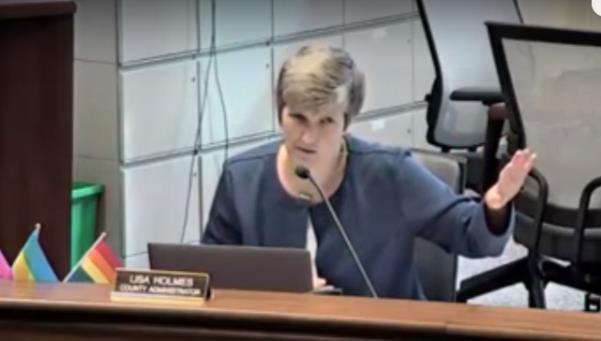
“I feel we’re not all on the same page on that most basic thing,” legislator Amanda Champion observed, addressing legislators’ past purported preference of the Key Bank/Wiggins office site, “even though that was Lisa’s understanding when we bought this property. That was the idea.”
“It was one person’s idea,” committee Chair Mike Lane bluntly replied. “That was Jason Molino’s idea.”
Jason Molino, Tompkins County Administrator until May 2021 and Holmes’ immediate predecessor, was, according to sources, the driving force between the Key Bank and Wiggins office purchases and the one person in County Government who clamped the tightest lid of secrecy over the acquisition’s seemingly endless negotiations.
“Well, but we agreed to buy it, and there was a lot of people who agreed with him,” Amanda Champion responded, answering Lane’s reference to Molino.

“I agreed,” Ulysses-Enfield’s Anne Koreman chimed in, concurring with Amanda and with the purchase.
“So, I don’t think that’s fair, Mike,” Champion continued, questioning Lane’s suggestion that the Key Bank/Wiggins purchase was a one-man initiative.
Evidenced by the exchange, many Molino supporters still sit on the County Legislature. But two of the Buffalo and Tioga Street land deal’s wildest legislative cheerleaders have now left. Former Downtown Facilities Committee Chair David McKenna of Newfield and Dryden legislator Martha Robertson both retired last December. Robertson once said that buying the Key Bank and Wiggins buildings fulfilled for her a 20-year dream.
But some recent legislative arrivals adopt a more pragmatic view.
“Why are we putting a Center of Government in a place that’s incredibly inaccessible to get to with vehicles when we have such a challenge with parking and cars and things like that?” Dryden’s Greg Mezey, Robertson’s successor, asked the committee Thursday. Mezey has talked in the past about creative Center of Government options like repurposing a part of the ailing Shops at Ithaca Mall.
“I’m not sure that it’s going to be cost productive to go on that corner,” remarked another legislative newcomer, Groton’s Lee Shurtleff. “I still have difficulty investing money, millions of dollars, into the City (of Ithaca), when the City can’t get a handle on the public safety issues down here.”
“I wouldn’t invest anything at this point,” Shurtleff continued, referencing Ithaca’s increased downtown crime, “until we see some things happen in these local neighborhoods.”
****
But back to the “Red House,” where the September 15th discussion was expected to have started and ended. The aging, vacant, two-story structure stands on the edge, yet still well within, the protected DeWitt Park Historic District. Most private owners couldn’t alter its façade, let alone demolish the building. But Tompkins County could legally pull rank on the City and pre-empt the historic preservation law. Any preservationist should grow disturbed that few legislators Thursday gave much of a passing thought to any ethical obligation to preserve history. Many saw little value in the “Red House” and would just as soon it go away, piece by piece.

“I can’t support selling this,” Mezey told the committee, the Dryden lawmaker among those who worried that if the” Red House” were sold, too little of the remaining lot would be left. “I would be in favor of deconstructing (tearing down) that building and then also studying that space and saying ‘what could we do?’” Mezey suggested maybe a day care center or housing.
Ignoring the broader Center of Government issue for the moment and focusing on the “Red House” itself, legislators saw three paths forward. Either they could sell the building with or without the land beneath it; tear it down now to enlarge the vacant tract; or else mothball the structure until the County figures out what to do. The County could use the building for offices someday, whether or not a Center of Government finds the 408-412 North Tioga Street lot its chosen landing spot; if, that is, the County paid a steep price to renovate it.
“You’re foreclosing doing anything with this property moving forward,” Groton’s Shurtleff warned as he argued against the building’s sale. “You can’t build much on what’s going to be left. It takes this area off the table for anything practical moving forward.”
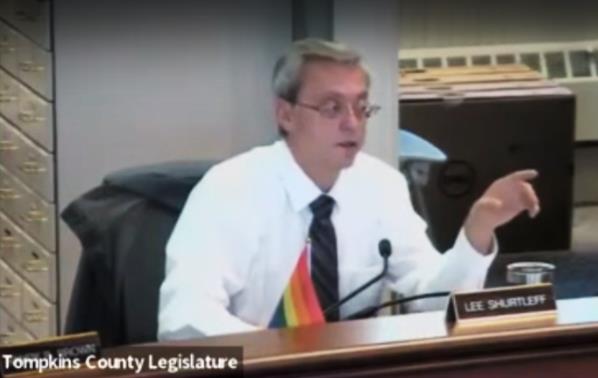
But committee chair Mike Lane supported immediate sale, as did Ulysses’ Anne Koreman.
“If we’re not going to do anything with that in the near future,” Koreman said of the building, “I am for selling it on for somebody else to take care of.”
“A vacant property, observed Koreman, a building inspector by trade, “is open for vandalism—water, critters, other things. The house is deteriorating, any empty building is; it’s deteriorating very quickly.”
And to those who might say, “What if a Center of Government goes there?” Koreman had an answer.
“If we build a Center of Government, it’s not going to be there,” Koreman asserted.
Retrofitting the aging, though historic, “Red House” would prove expensive. County Director of Facilities Arel LeMaro conceded that just mothballing the building wouldn’t cost much, perhaps $20,000 in continued insurance. A “basement abatement,” the lowest-level upgrade, would cost $49,000, LeMaro said. But retrofitting it for permanent government offices could cost $1.17 Million.
Committee Chair Lane predicted code compliance would require adding sprinklers and an elevator. The elevator might need to go on the building’s outside.
Improvements would probably cost “more than the building would be worth when you’re done,” Newfield’s Randy Brown predicted.
“If you don’t sell it,” Brown said, “I would support deconstructing it and keeping the property.”
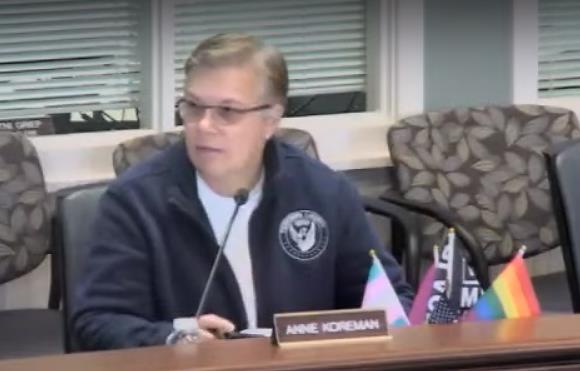
But with lawmakers unsure of even where to build a Center of Government, little seems more certain than that for now, what lies to the west and north of 408 North Tioga—including the County-owned former Baker Dental Building, soon, itself, to be deconstructed—will remain just a bare, employee parking lot.
“I don’t have a problem with this being a parking lot half a block away from our county campus,” Mike Lane told the committee he chairs. Lane wants to keep County offices downtown, near the Courthouse. So he views an overflow lot as something essential. “I don’t think that’s something we have any apologies for,” Lane said. Too many County employees, he maintained, have no place to park.
Yet both Amanda Champion and Danby legislator Dan Klein recognized what might have become the most conspicuous take-away from Thursday’s discussion; indecision and an absence of vision concerning the “Red House’s” future.
“We’re doing things piecemeal without a plan,” Klein maintained.
“If we decide not to sell it, we need to have a better plan,” Champion insisted. “We can’t just say we’re not going to sell it and let it sit for three more years.”
Champion was referring to the “Red House.” But she could just as easily have referred to the Center of Government itself. The meeting could have used a Jason Molino. He, most definitely, would have had a plan—whether you’d like that plan or not.
###
Senior Break: Enfield Board ponders elder taxes; counting dogs
by Robert Lynch, September 17, 2022
It wouldn’t take hold until the January 2024 tax bills. But judging from members’ September 14th discussions, the Enfield Town Board will likely raise the income ceiling that allows qualifying senior citizens and the disabled to claim a 50 per cent reduction in their town property taxes.
Wednesday’s Board tax talk came in response to a new state law that nearly doubles the allowable exemption municipalities can approve. It also follows a recent committee recommendation downtown that would increase the senior exemption for Tompkins County’s share of the property tax.

“It’s due time that they (the state) at least provided the option for local municipalities to do what’s right for their community,” Jay Franklin, Tompkins County’s Director of Assessment, told the Enfield Board.
“I’m not here advocating for or against these exemptions,” Franklin stressed. “I’m just here to provide the information that you need to make that decision.”
Based on Wednesday’s discussion, it’s all but certain that the Town Board will elevate Enfield’s senior citizens’ exemption beyond the $24,000 where it stands at present. The question remaining unanswered is how much higher the exemption might rise.
Franklin said Enfield last raised its senior exemption in 2016. The Town’s cutoff presently falls $5,000 below County Government’s own $29,000 limit. But based on a resolution drafted in committee earlier this month and set for approval by the full County Legislature September 20th, the Tompkins County threshold would rise to $35,000. One County legislator, in committee, said he’d support raising the figure to $40,000.
The state law adopted this year raised the exemption’s allowable New York income limit from $29,000 to $50,000. Franklin suggested the uppermost limit of the income ceiling was likely aimed to address pricier downstate properties on Long Island and in Rockland County. Under the State’s formula, seniors earning slightly above the 50 per cent exemption ceiling could obtain reductions of a lesser percentage.
“I wouldn’t want to go any lower than 29 (thousand),” Supervisor Stephanie Redmond said of the Enfield senior exemption. Her statement would set a floor that would be $5,000 above its present level.
“I think we have to go up from what it is at present,” Councilperson Robert Lynch (this writer) responded. “Whether we go to 35; whether we go higher, I think we need a range of options,” Lynch added.
At the Town Board’s request, Franklin will predict the financial impact of various options: of raising the exemption limit to $29,000, to $35,000, or even to $40,000.
When the senior citizens’ exemption rises, of course, younger taxpayers must make up the revenue difference. The Assessment Director said that based on his initial estimates, raising the exemption from $24,000 to $29,000 would make 25 more Enfield residents eligible, 105 people in total. Were that to occur, Franklin said, the Enfield tax base would fall by $2,366,000, producing an eight cent per thousand rise in the Town tax rate and a $14 tax increase on the average Enfield home.
The Town Board need not decide the exemption rate right away. Seniors would have until next March 1st to file for it. Franklin would prefer the Town act before December.
Lynch suggested the Town Board at a future meeting `set aside time for the public to weigh in. “We might hear from seniors or non-seniors about what we should do,” the Councilperson said.
****
Enfield dog owners will soon hear from the Town—at their door.
For the first time in a dozen years, and upon Town Clerk Mary Cornell’s recommendation, Enfield will conduct a house-by-house enumeration of dogs, primarily to detect which canines’ owners have not licensed them.
“Hopefully, people will be honest,” Lynch said as the Town Board Wednesday set terms for the enumerator’s compensation. “Don’t say you don’t have a dog if the dog is jumping up on the storm door,” Lynch joked.

Upon Clerk Cornell’s recommendation, the Board assigned Enfield resident Pat Baker as the enumerator. The key discussion Wednesday involved how much Baker should be paid.
Enfield’s last dog enumeration occurred in 2010. Back then, the Town paid the enumerator $2.00 per dog and 50 cents per mile traveled. Inflation would now elevate that compensation to $2.72 per dog, and the IRS mileage rate has risen from 50 to 62.5 cents, a mileage increase Cornell recommended, and the Board accepted.
But somewhat resembling an impromptu auction, Board members tossed about various figures for the per-head snout count.
Supervisor Redmond first suggested $3.00 per dog. Lynch agreed. But Councilperson James Ricks wanted a higher payment, as much as $5.00 for each dog found.
Ricks warned of 100 pound pit bulls, not to mention their ornery owners.
“I think this is a pretty challenging job,” Ricks remarked, “not just dealing with the dog, but with the people.”
In the end, the Town Board split the difference, setting the enumerator’s compensation at $4.00 per dog.
With the last count having found about 800 Enfield dogs, Cornell estimated each dollar increase in the enumerator’s compensation would cost the town nearly $1,000. Yet the count is somewhat self-compensating, since the owner of an unlicensed dog found in an enumeration is subject not only to a licensing fee, but also a $10.00 per dog surcharge.
“This has to be done,” Lynch acknowledged. “There are probably some people out there that wish the dog enumerator would not knock on their door. But we have to do it to be fair to those who responsibly license their dogs.”
In other Town Board business at the September 14th meeting:
- After a public hearing that brought forth only a couple of resident questions and no objections, the Town Board adopted a local law and its accompanying policy statement that permits a Board member to attend a meeting—and vote—via teleconference, but only under “extraordinary circumstances,” emergencies such as illness, disability or caregiving responsibilities. A quorum of Board members would still need to convene at a fixed location where the public was also invited to attend. The policy differs from that permitted during the past couple of years, when state-declared COVID-19 emergencies enabled the entire Town Board to meet remotely.
- Supervisor Redmond reported that the New York State Department of Transportation has granted the Town’s request to lower the posted speed limit on a two-mile stretch of Mecklenburg Road, NY Route 79, from 50 to 45 miles per hour, effective immediately. By the following weekend, the lower limit signs had already been posted. NYSDOT, nonetheless, declined the Town’s request to construct sidewalks on that same route near Miller’s Corners. It means that if the Town wants sidewalks, it will need to build them itself.
- And for over an hour, Paul Fenn of the firm Local Power LLC, held an online give-and-take discussion with the Board concerning the Town and City of Ithaca’s efforts toward establishing a Community Choice Aggregation (CCA) program for the bulk-purchase of electrical energy on behalf of municipal residents. Following Fenn’s presentation, the Enfield Board took no action on whether to join the Ithaca CCA. (Expect the later posting of a separate story concerning this discussion.)
###
CPE’s Foot-Dragging delays release of Reimagining docs
by Robert Lynch, September 12, 2022
Former Mayor Svante Myrick has reportedly responded. So has Ithaca Acting Mayor Laura Lewis, in her case, likely through the City Attorney. Two key advisors in the City-County effort to restructure local policing have also supposedly answered an ethics panel’s call for information. But because one lone, high-profile holdout implicated in the controversial Reimagining Public Safety initiative is dragging its feet, the panel investigating City Hall’s alleged ethics violations surrounding policing reform decided Monday to delay making public anyone’s written responses… but only for about a week.

Rich John, Chair of the Tompkins County Ethics Advisory Board, disclosed at the Board’s brief meeting Monday that only the Center for Policing Equity (CPE), a Yale University-based, police-critical non-profit that played a central role in the 2020-21 Reimagining Plan’s drafting, has delayed its requested responses to questions the panel posed to address the ethics complaint brought this spring by Ithaca Alderperson Cynthia Brock.
John initially gave CPE officials an extended August 31st response deadline to answer the questions his panel had posed.
But CPE officials, according to John, first told the chairman they’d need “a couple more days” to finish their response. Then CPE pushed it off for another week—until this week. Yet nothing was in hand by Monday morning. “I don’t know where that stands right now,” John said of CPE’s dilatory response.
Without having CPE’s explanation of its own role in Reimagining, and not wanting CPE to dovetail its answers with those of Myrick, Lewis and others, the Ethics Board Monday altered its original intention to release the other written responses perhaps as soon as that day’s meeting. Instead, the Board opted to delay release until CPE’s comment comes in, but in no instance, to withhold disclosure beyond the end of the week.
“If we don’t hear from CPE by the end of the week, we hit go,” Advisory Board member Kathleen Walpole said.
Though the written comments received to date were discussed by the Board in closed session following Monday’s 25-minute open meeting, they have yet to be made public. Nonetheless, a diligent party could retrieve them even now via a Freedom of Information Law request.
CPE, which both City and County severed all ties with in June, served as a key player in assembling the data and writing the overly-ambitious, 96-page Reimagining Public Safety collaborative report, a document that both Ithaca and Tompkins County submitted New York State in April 2021 in answer to former Governor Andrew Cuomo’s command after the George Floyd killing. Cuomo did nothing more than put the exhaustive and expensive local document on a shelf. Yet, Ithaca officials used it as a blueprint for sweeping changes in local policing, including recasting the Ithaca Police Department into a civilian-led agency.
Because, in part, from CPE’s involvement, and from the financial transactions involving both it and local Reimagining advisors Karen Yearwood and Eric Rosario, Alderperson Brock authored a complaint which this spring landed before the Ethics Board. The Board, in response, sent out a series of letters to Reimagining’s key players in June. Many of those contacted delayed compliance throughout the summer, including officials like Acting Mayor Lewis, whose responses were funneled through the City Attorney, Ari Lavine. Yet to date, according to John, only CPE’s answers remain unreceived.

“Given this is a public investigation and it’s dragged on since the spring, I am concerned that we are waiting too long,” John told the Ethics Board Monday in urging that written responses, still secret, be made public as soon as possible.
“There might be some issue with helping witnesses to prepare,” John acknowledged, noting that the Board’s making written responses public could guide others’ comments in subsequent interviews. “But because of the actual substance of what we’re investigating, which was really a secretive process,” he added, “I don’t want us to be accused of that either.”
For a time Monday, Ethics Board member Brian Eden held out for keeping all written replies secret until the Board had finished its interviews.
“I wouldn’t want to release these documents piecemeal,” said Eden. He said it “might give an unfavorable impression of one submission or another.”
Eden suggested the Board’s ethics inquiry mirror that of Congress’ January 6th Committee. First would come written responses and then interviews where one witness doesn’t know what another might have said.
“You don’t want to put any cards on the table before you talk to people,” Rich John said in agreement. “But I’m not that concerned that the witnesses we’ll talk to are going to gain any real information that will help anybody obscure the facts when they talk to us.”
Nonetheless, some of the statements Advisory Board members will eventually release may bear those familiar black lines of redaction. The edits were recommended Monday by the Board’s attorney, Dan Rose.
“I can think of at least one open question that I’ve seen,” Rose said, “that those interview questions, those answers might change in order to bring the stories in line.” Rose did not elaborate. Given the Ethics Board’s final resolution, expect all respondents’ answers to face vetting in executive sessions before those responses—unless accessed through FOIL—are shared with the public.
“I don’t think we’re going to get gold stars from everybody, no matter what we do,” Rich John conceded. “Somebody is going to tell us we didn’t do a very good job. And I think we kind of have to ignore that and follow our best judgment and do the best we can.”
The Ethics Advisory Board agreed to next meet September 21st. No precise plans for comment disclosures prior to that meeting were discussed.
###
Enfield Planners bypass “zoning” in land use talks
Analysis by Councilperson Robert Lynch, September 8, 2022
At the end of a more than 90-minute discussion of possible new land use controls Wednesday, Enfield Planning Board member Mike Carpenter asked the question most demanding an answer: Are we talking about writing a zoning ordinance here, he said.
Planning Board Chair Dan Walker offered a ready answer: No
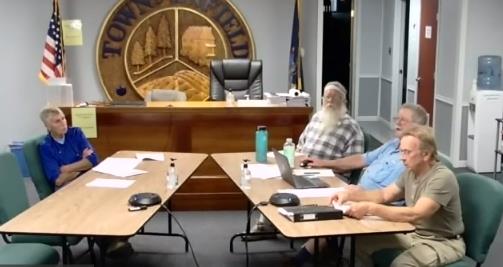
“We’re not creating a zoning ordinance,” Walker responded. “We’re just looking at land uses”
Two members of the Enfield Town Board attended the September 7th meeting. Supervisor Stephanie Redmond participated minimally as she ran the hybrid meeting’s electronics. Redmond voiced no objections to Walker’s assessment. I, one of Enfield’s four Councilpersons, remained silent. But I wholeheartedly support the Chairman’s conclusion.
Zoning, the “dreaded Z-word” as some like me call it, has bounced around all summer in Town Board and Planning Board meetings. It’s come up as an option to consider as Enfield’s leaders, most notably Redmond, have discussed the need for tighter land use controls. They see the need to regulate heretofore undetected, not-yet-seen invaders to our town, interlopers like a massive apartment complex or a commercial landfill. Zoning’s never been tried in Enfield. And I sense many hope it never will be.
But the Planning Board, to whom Redmond has deferred in seeking Enfield’s best line of defense, spoke little of the zoning option Wednesday. Members mentioned the word with only glancing attention, usually as an adjective, preferring instead to talk of controls already well within Enfield’s arsenal; restraints like our Subdivision Regulations and Site Plan Review Law.
“Large commercial development is probably the biggest question we can deal with in the Site Plan Review Law,” Chair Walker told the Planning Board. And before the discussion had ended, Walker had penciled-in a few potential changes of his own.
“Large commercial development”—never defined in any more specific terms—stands among five areas of developmental incursion that the Supervisor has feared could despoil Enfield’s rural character. The remaining categories, identified at a Town Board meeting August 10, are a possible landfill, the proliferation of too many solar farms, large housing developments, and “noxious industries.”
The landfill threat (real or imagined) gained little Planning Board attention Wednesday. Walker waved off the solar farm question for the evening, suggesting those controls are best kept within the Town’s Solar Law, currently undergoing a separate overhaul.
Wednesday’s regulatory discussion—it was the only topic on the Board’s agenda—brought forth no immediate recommendations. But those talks did signal a sense-of-the-body consensus that a low-key, go-slow approach to regulatory reform will work best. A Planning Board review of the subdivision and site plan codes began months ago. Expect it to continue for months to come.
“The world has changed,” Board member Mike Carpenter remarked during the discussion. Carpenter said he’d already found “five or six significant questions” that the Town’s regulations needed to address. One of his concerns, similarly shared by others on the Planning Board, was where to draw the line between “agricultural” and “commercial” activities. The former often evade control through state or local laws. The latter better lend themselves to enhanced hometown oversight.
“If you have a cow up-front in your facility that manufactures shoes,” where does it fall? Carpenter asked. Is that “agricultural?”
And for that matter, one wondered, is the Cornell Vet School considered agricultural or commercial?
“It depends on the size of the animal,” Board member Ann Chaffee fired back.
Planners pondered this dividing line as they asked whether Enfield holds any control over the shuttered Genex artificial breeding facility off Sheffield Road. Genex was built before Enfield enacted site plan review. Now closed for more than a year, Genex’s eventual buyer could face Planning Board oversight for any future use it intended. The Site Plan Law’s one-year “abandonment” clause, Walker suggested, could enable the Town to review a future owner’s plans.
Yet the limits offered an agricultural classification could become tested in other ways.

“Are animal feeding lots protected under agricultural law?” Carpenter asked. What if spread manure falls dangerously close to residential wells and runoff contaminates them? “It’s an understood law that water goes downhill,” he said.
“Do we want to have someone come in here and build a 4000-square foot slaughterhouse?” Walker asked. Or, for that matter, a “100,000 chicken production facility?”
“How do we make it clear what we want and what we don’t want?” the Board Chair questioned.
And to what extent, member Henry Hansteen questioned, can the Planning Board stop something it doesn’t like? What weight, Hansteen asked, can objections at a public hearing constitute legal grounds for rejection? How far can the Board go before the Town ends up in court?
But an overly-restrictive law can become ridiculously arbitrary, too.
Chaffee reported that in oppressively-zoned Ulysses, just to Enfield’s north, a dog kennel can be just about anywhere in the town, but a veterinary practice may only locate along the Route 96 corridor.
And as to another of Supervisor Redmond’s concerns, what constitutes a “loud or noxious industry?”
“How do you regulate ‘loud or polluting’ in a legal way,” Carpenter asked. “I don’t think you can say you can be loud and polluting without having a better definition.”
Indeed, it was the definitional element that bothered Carpenter the most.
“I want to know what we want to regulate,” he inquired, and how the law addresses it?
At times, Carpenter found Supervisor Redmond’s directives short on specifics. If you want to limit too many solar farms, he said, the question becomes, “too many based on what?”
What little substantive regulation did emerge during planners’ hour-and-a-half roundtable came via Dan Walker’s laptop. The Board Chair shared his preliminary edits for tightening the Site Plan Review Law’s criteria for when a proposal triggers the Planning Board’s attention.
Walker’s amendment would apply site plan review to “industrial or commercial uses which occupy more than one acre of land,” and also to auto salvage yards, and motor vehicle repair or sales establishments.
The chairman’s changes would also cut the size of any proposed commercial or industrial structure requiring review from 10,000 to 5,000 square feet. The change would apply to building conversions as well as to new construction.
But while regulations will evolve meeting by meeting, the laid-back nature of Wednesday’s session became the evening’s most significant take-away. At times in recent months, the Town of Enfield has appeared barreling toward some sort of quickly-drafted zoning law, one that Town constituents had neither requested, nor vetted. Judging from Wednesday’s more relaxed, inquisitive proceeding, the pressure appears off. The Planning Board meets but once a month. A gently-moving barrel only rolls so fast.
###
Tompkins 2023 Budget tops $200 Million
Airport the Big Money Sink
by Robert Lynch, September 6, 2022
It’s great to have a $35 Million new airport terminal. Now if you only had some planes to fly there, with airlines and their passengers to help pay off the loan.
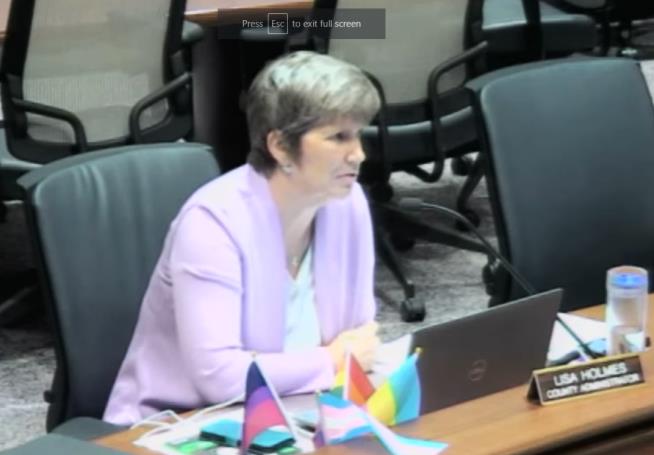
With projected airport deficits the big downer of the night, Tompkins County Administrator Lisa Holmes presented the County Legislature Tuesday her projected 2023 Budget. For the first time the budget’s total—a somewhat misleading figure since it includes many expenses and revenues washed through from other programs—would top $200 Million. The $207.7 Million projected total would rise some 6.4 per cent from the $194 Million of the current year’s spending plan.
Of that larger total, just over $53 Million would be raised by property taxes. As Holmes summarized her office’s proposed spending package to the Legislature, even though the tax levy would rise 1.46 per cent over the year, the increase in property assessments far outpaces that increase. Because taxable assessed values grew by an average eight per cent over the year, the actual per thousand tax rate would actually fall about six per cent.
For the average median family home—now increased in value to $225,000—the proposed budget would actually, according to the County’s estimates, decrease the County tax bill by $83; that is, of course, providing your assessment hasn’t gone up.
Holmes called the economic factors driving her budget “a mixed bag.” But in that “bag” the softest bad apple is the County’s “International Airport,” an optimistic marketing moniker that’s increasingly sounding a hollow ring.
American Airlines has pulled out. Passenger traffic has never rebounded from the pandemic. Yet government has the cost of a $35 Million terminal expansion and modernization to pay back. Passenger Facility Charges (PFC’s) were supposed to repay the debt. But sadly, for the foreseeable future, they won’t.
“Current PFC revenue generated by these enplanements is insufficient to cover the Airport’s debt service on the terminal project as previously expected,” Holmes warned legislators. “The 2023 recommended budget includes $342,481 to pay half the debt service on this project, with the remainder to be covered through PFC revenue. It is expected that the County will need to cover the debt service at least through the next 3-5 year period until enplanements increase and PFC revenues rebound,” the Administrator said.
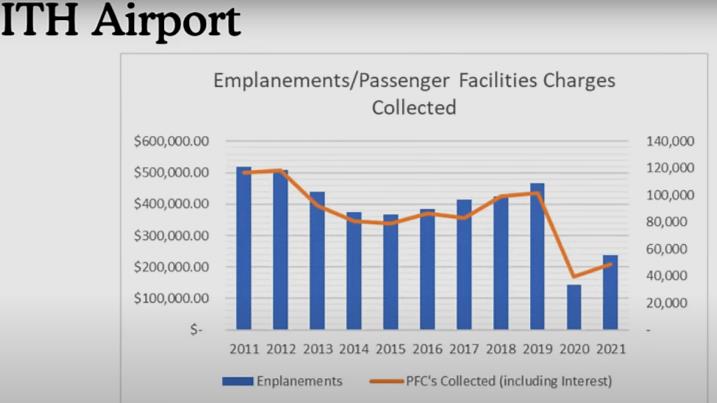
Of course, that’s the hope. But that’s just debt service. There’s also the need to keep the airport’s lights on, while not pricing so-called “ITH” out of the market more than it already has been. So Lisa Holmes’ budget message brought to legislators more bad news.
“Without assistance to bridge the gap,” caused mostly, Holmes said, by American’s exit, “the Airport cannot offer competitive airline rates and charges to maintain existing airlines or attract new carriers, nor will it be able to balance its operating budget.” Therefore, for at least the next three years, County taxpayers will need to provide a lifeline.
“The 2023 recommended budget includes a series of three diminishing one-time over target requests to assist the Airport through this period of recovery,” the Administrator said. Holmes budget sets those projected subsidies at more than $1.3 Million for 2023, $800,000 in 2024 and $300,000 in 2025.
Lansing legislator Mike Sigler had a question: We put aside $7 Million of the County’s nearly $20 Million allotment of American Rescue Plan moneys for the Community Recovery Fund, Sigler acknowledged. “Is this money (the airport subsidy) coming out of a balance of the ‘ARPA’ funds, or is this just coming straight out of taxpayer dollars,” Sigler questioned Holmes concerning the airport subsidies. “It really should come out of ARPA funds,” he continued, “This is a pandemic problem.”
Sorry, Mike, the question makes too much sense when you confront federal bureaucracy.
“I don’t think that County ARPA funds could be spent toward the Airport,” said Holmes, “because they’re not allowed to be combined with other payments that entail federal grants. The Airport did receive its own ARPA funds designated specifically for the Airport.”
Shortly after Holmes answered Sigler’s question, Legislature Chair Shawna Black reminded all who cared to listen what too often happens—and happened here—when government tries to do private enterprise a favor.
With another federal pandemic relief effort, the CARES Program, Black said, “We voted to actually give some of that money back to the airlines, and of course, one of the great airlines left after they received their CARES money.”
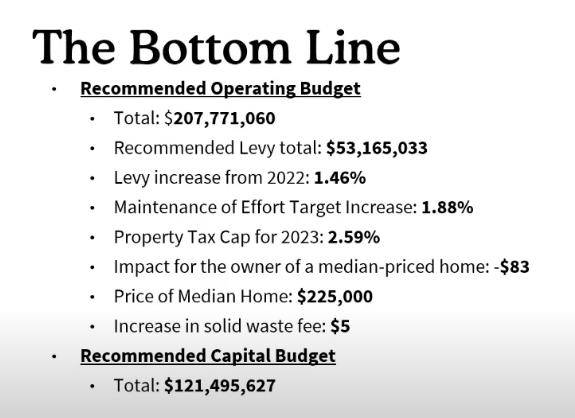
Holmes’ nearly hour-long budget presentation to the Legislature revealed that projected County staffing next year, an estimated 750 employees, will regain all of the positions Holmes predecessor, former Administrator Jason Molino, had shed from the County payroll in a cost-cutting move just after COVID-19 hit. Holmes projects adding 32 new positions in 14 departments, the largest in the Health Department and toward Reimagining Public Safety efforts in various County departments.
The County Legislature will spend much of the next two months scouring the proposed 2023 County Budget line-by-line in what becomes a quintessential exercise in fiscal micro-management. Department Heads will be summoned to Legislative Chambers in meetings sometimes held several times weekly. Lawmakers won’t adopt the final County Budget until November.
###
Eight is Enough… Maybe
Indecisive Straw Poll may keep Ithaca School Board seat open
by Robert Lynch, September 6, 2022
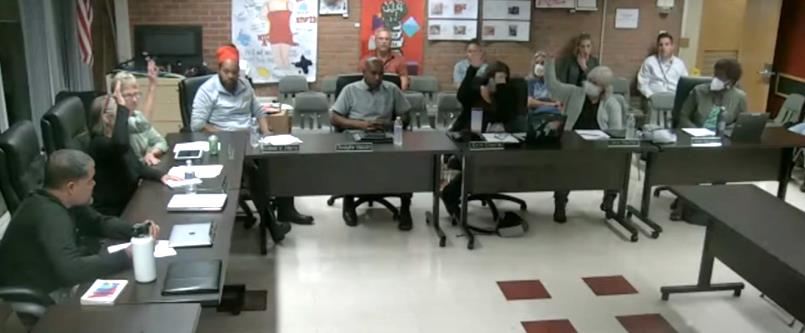
The Ithaca Board of Education appears headed toward a decision the Enfield Town Board refused to make 20 months ago, namely to have a resigned Board member’s seat left open until voters have an opportunity to fill it themselves in the next scheduled election.
In a non-binding straw poll whose results neither carry legal weight nor even mustered majority support among those voting, the eight remaining members of the school board balloted late last month not to fill immediately the seat suddenly vacated in early-July by member Nicole LaFave. LaFave resigned unexpectedly after completing only one year of her three-year term.
Three choices lay before the School Board at its August 23rd session. Members could have called a special election to fill the LaFave vacancy, filled the vacancy themselves, or simply declined to act, thereby reducing the nine-member board to eight persons until the next regular election in May 2023.
“That indicates to me it’s not a majority, but does speak to me the direction that we’re going,” Board President Dr. Sean Eversley Bradwell said after four members supported keeping the vacancy open, another two indicated they’d favor a board-made appointment, and the remaining two, including Bradwell himself, abstained.
The Board could reverse its position at any future meeting.
The Ithaca School Board’s significant preference for inaction stands in stark contrast to that of the Enfield Town Board following the September 2020 resignation of former Town Supervisor Beth McGee.
Following three months of pressured insistence by some of McGee’s former colleagues, and several subsequent resignations that complicated the process, a pared-down, three-member Enfield Town Board installed former Councilperson Stephanie Redmond as Supervisor in January of last year. The process left ill will among some Board members that lasted through the November 2021 General Election.
To date, the customarily outspoken LaFave, a minority rights activist who also waged an unsuccessful campaign for the Tompkins County Legislature in 2021, has not spoken out publicly on her reasons for leaving the Board. Her term would have run through June 2024.
Though a Special Election remained one of the Ithaca School Board’s options at its meeting August 23rd, none of the eight continuing members showed any interest in it. Cost appeared the reason. Dr. Bradwell indicated such an election would cost the school district at least $60,000, perhaps nearly $80,000.
The winner of a Special Election would serve out the remainder of LaFave’s term. A person appointed by the Board would only serve through next spring.
There remains one wild card however. And it involves the heavy hand of the State.
“Under special circumstances, if the Board does choose to keep the seat vacant, the Commissioner of Education could force us to appoint—command the Board to appoint somebody,” Bradwell cautioned. “But that has not happened that I’m aware in quite some time.”
Board members appeared willing to call Albany’s bluff on that point.
But opinion divided on whether it’s best to bring the Board to full strength with an immediate appointment. Members Eldred Harris and recently-elected member Karen Yearwood supported appointment.
“My instinct,” said Harris, “is to use the opportunity to appoint someone who either has been with us in the trenches before… or use the opportunity to get some new blood as it were—a rising young superstar in the community.”
But Board member Erin Croyle remembered all too clearly the tumultuous, error-laden election of just last May, one where some voters were mistakenly instructed to vote for the wrong number of candidates, polling places occasionally ran out of ballots, and one candidate was disqualified at the last minute with voters at first not accurately informed as to why he was purged from the ballot.
“Given for lack of a better word, the messiness of the election,” said Croyle, “I don’t know who we could appoint that’s out of nowhere, because I don’t feel like the numbers—given everything, it speaks for itself.”
“I wouldn’t be comfortable appointing anyone based on who was voted for in the spring,” Croyle concluded.
Of course, a Board-made appointment need not rely on last spring’s election. But member Patricia Wasyliw reminded colleagues that the Board has often followed that course in the past. Wasyliw said that for past vacancies, Board members have usually either appointed the next highest vote getter in the most recent election, or just left the vacancy open.
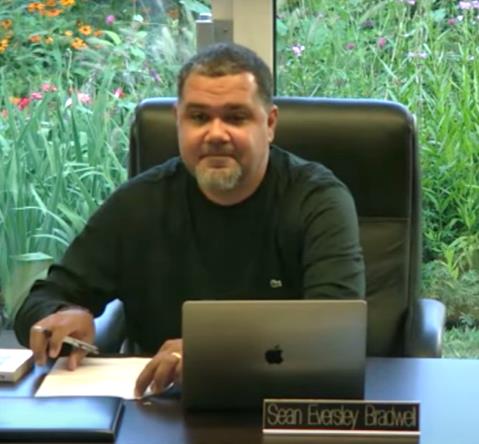
“And I agree with you about the messiness of the last election, Wasyliw told Croyle, “and the real fuzziness around numbers. I think that’s a significant point of dissatisfaction among the voters”
Nonetheless, Wasyliw added, “I have always been uncomfortable with the idea of eight people choosing someone to be on the Board for even the greater part of the year who hasn’t been voted for. That seems to me to be less desirable than handing a position to someone who did get votes.
“We have left a position vacant just as often as we’ve filled it,” Wasyliw concluded. And she joined Croyle, Moira Lang, and Jill Tripp to support keeping LaFave’s vacancy open.
“I find the reasons for not appointing anyone very compelling,” Tripp said. A special election costs money, she said. And a continued vacancy “avoids possible intrafamilial conflict about who the person to appoint should be.”
So for now, at least until the Ithaca School Board’s next meeting, the seat Nicole LaFave vacated July remains empty.
###
“Exploding” housing market prompts local Assessment change
by Robert Lynch, September 3, 2022
Consider this year’s Tompkins County race for real estate as lying somewhere between a seller’s market and one for “suckers” only.
“I’ve never seen a real estate market like this,” County Director of Assessment Jay Franklin told a committee of the County Legislature Thursday. “Realtors and appraisers who’ve been around longer than I’ve been alive have never seen a real estate market like this as well.”

And because of the runaway inflation in housing as well as everything else that sits on land, Franklin is proposing a change in local assessment procedures that neither he nor likely anyone else is bound to like.
First to the runaway values themselves: Franklin reported to the Legislature’s Government Operations Committee Thursday that residential real estate, by his calculations, has risen 27 per cent this year over last. For houses that have sold multiple times, without improvements, prices have escalated by an annual 22 per cent since COVID-19 hit.
“That type of increase in the real estate market is something that we’ve never seen here before,” Franklin said. “Even when other places in our country saw an increase in the early-2000’s, we still trudged along at a mere three-to-five per cent per year. We didn’t see this sort of explosion.”
Yet even more explosive is the local market for commercial real estate. It’s become a bidding free-for-all in which irrationality has truly taken over, a market where the cash flow from rent checks may become the last element a manager considers when laying his money down.
“There is not a single commercial sale that makes financial sense that we’re seeing, especially in multi-family housing,” Franklin told the committee. “We’re seeing out-of-state companies, out-of-country companies that are buying up real estate at values that are not supported by the income that they can produce.”
Why are real estate investors ignoring what most would see as basic economics and sound common sense? The Assessment Director suspects it involves a combination of ego, status, and tax avoidance.
Commercial real estate managers have “other measures in their mind,” said Franklin. “They want to become bigger. They want to gain 200 units in (or more accurately stated, near) an Ivy League school. They’re trying to hide money. They’d rather put money in real estate than have it in their bank account.”
Franklin also said managers can also use sly accounting tools like “accumulated depreciation” to wash away taxes they’d otherwise need to pay.
Amidst all this speculative craziness, the Assessment Director asked of the Government Operations Committee—and received its recommendation—to suspend his Department’s long-standing policy of assessing all properties at 100 per cent of value. Instead, because the Department lacks staff to revise all properties every year, Tompkins County would temporarily revert to a three-year assessment cycle, coupled with a practice of assessing all parcels at a “uniform percentage of market value,” a figure the Director would set later. The number Franklin most often mentioned Thursday was 80 percent.
The Government Operations Committee recommended the change by a 4-1 vote, forwarding its Resolution to the full Legislature for a final vote later this month.
It “pains me to bring it to you,” Franklin told committee members of the three-year cycle he’d proposed. He may have good reason for his reticence… and a memory to match. Though most other municipalities in New York practice multi-year valuation and employ fractional assessments, Tompkins County has not done so for about 15 years.
Tompkins’ last experimented with fractional assessment in the mid-2000’s. And when it did so, according to one County point-person, someone no longer in government, it was a “disaster.” Residents didn’t understand it. County officials found themselves hard-pressed to convey the rationale. `And what taxpayers especially couldn’t comprehend—or accept—was when the partial valuation ended and a return to full values led to assessment notice sticker-shock.
Indeed, at Thursday’s meeting, even one member of the legislative committee found it hard to wrap his head around the concept of partial valuation. Another member had misgivings.
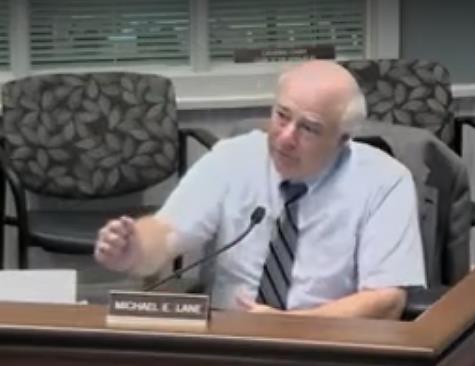
“This is a sore subject for me,” Dryden legislator Mike Lane told the committee. Lane was on the Legislature in 2005 when it last authorized a three-year assessment cycle. He supported it then. “I argued people needed a break,” Lane said, recalling an earlier era’s housing run-up prior to the Great Recession.
But then, Lane also remembered, the Assessment Department “just kind of saved it all up, and then after the third year, they smacked ‘em, everybody with a big increase in assessments.”
“Assessments don’t determine taxes; tax levies determine taxes,” Franklin reminded Lane, recognizing that with a constant levy by government, tax bills remain unchanged if all properties rise or fall in taxable value by a constant percentage.
“I don’t disagree with you, Jay,” Lane acknowledged. “But we know how people think.”
State law demands equitable assessments, but not full-value assessments. Fractional valuation, in an inflationary housing market, prevents those assessed this year from paying a disproportionately larger percentage of government’s costs compared to those assessed only years earlier, back when home prices were lower.
Lane questioned Franklin on how much additional staff he’d need to institute annually-revalued, 100 per cent assessment. Franklin said he’d need a lot of people, especially during the year’s first two months, people to schedule informal grievance sessions. Lane would have given Franklin the necessary manpower. And the Dryden lawmaker voted against the committee’s resolution for just that reason.
Yet even the Assessment Director recommended against hiring the people and taking the time to do the job the way he’d otherwise prefer it be done. “Our office is not designed to do a countywide revaluation in a single assessment year,” Franklin wrote the committee.
Annual reappraisal amidst this “crazy” market, Franklin told the committee, would “just cause more confusion, more headaches.”
“If anybody says they know exactly what’s going on in the real estate market, they’re lying to you,” the Director cautioned the committee.
****
And just why are local housing prices rising so high, so fast?
“Our supply of houses just isn’t there,” Franklin remarked. “The demand is so high and there’s still a lot of money around here.”

What’s more, Franklin acknowledged, there’s “the emotional appeal of houses.”
“Size doesn’t matter anymore,” the Director told the committee. “It’s more about how does that house appeal to you? Does it say ‘This is where you want to live’?”
More value, he said, is being placed these days on exterior spaces—exterior kitchens and patios, green spaces, ponds and creeks. “People want their private estates again,” Franklin said. “There’s more that people are looking at.”
That sort of forecast may bode well for Enfield real estate, where fields and ponds lie in ample supply. Though an “exterior kitchen” might find it hard to survive an Enfield winter.
###
A Head Inside the Tent
Competing visions underlie debate over Enfield land use controls
Analysis by Councilperson Robert Lynch; September 1, 2022

Reasoned disagreement forms the heart of a vibrant democracy. In America, unlike in many other places, our founding principles grant us political liberty. We hold the right to elect our representatives. They, in turn, act on our behalf. Those we elect exchange their individual, competing visions in open view on how society should advance. It’s only when our leaders detour onto the rutted road of agenda-centered activism and personal attack that the wheels of constructive debate fly off and democracy’s best hopes veer toward the ditch. It’s happened in many places, at many times, and at many levels. It’s happened in Enfield all too often in the past. Let’s not let it happen now.
Wednesday, August 10th, our Town Board spent five minutes short of a full hour weighing, conceptually, the prospect of new, bold land use controls. At times, we’d reference our shiny tool of construction as “zoning.” At other moments, we’d abhor mere mention of the word. Of the five servants who comprise our Town Board, one of us dominated the discussion. A couple spoke hardly at all. I, for one, found our wandering thoughts begging for a well-deserved conclusion. Repetition resembled a dog chasing its tail. We talked too long. We accomplished too little. And in my opinion, we ended the hour far worse than when we began.
Our Town Supervisor, Stephanie Redmond, fears about Enfield’s future far more than I do. To her, dangers lurk; dangers others do not see. To her, rapacious predators of all stripes lie in wait to despoil our town’s quaint, rural character and impose residential and commercial development never before seen in this peaceful, bucolic community.
Might the sprawling, stinky Seneca Meadows landfill migrate from “Mount Trashmore” in Waterloo to a regulation-free hilltop haven off Harvey Hill Road? Might the Energizer Bunny suddenly acquire the shuttered Genex lab along Sheffield Road and begin assembling nickel-cadmium batteries there instead of extracting bull semen? Or might Yvonne Vandemark’s field at Miller’s Corners suddenly spawn an 80-unit apartment complex instead of innocuous shoots of corn and roly-poly bales of hay? Supervisor Redmond fears each might happen.
Others in Town Government—I, for one—question our Supervisor’s doomsday apprehensions. Those like me see Enfield as a welcoming, albeit needy, rural outpost positioned just an ever-so-short drive from boomtown Ithaca. We’re a great community. But we’re starved for lack of reasonable, common-sense growth. Persons like me find too much abandoned acreage left to goldenrods and brush; too many wonderful people struggling with substandard housing because that’s all they can afford; too many hardworking families craving a January 31st tax break for which a stronger assessment base would help reduce the bill and soften the blow. They, unlike Supervisor Redmond, might welcome a McMansion or two… or thirty.
Contrasting perspectives; divergent predictions. Our varietal visions propel meaningful banter at Grange dinners, in chance encounters at the Dandy Mart, and most importantly, during Town Board deliberations. At the latter, however, Enfield tradition too often finds someone dribbling drops of gasoline on the table; another lighting a match. Debate self-destructs. Once a few years ago, the cops had to be called.
Town Planning Board members have for months plodded through Enfield’s Site Plan Review Law and our Subdivision regulations; in each instance, penciling-in, line by line, carefully-contemplated updates that only hold importance when somebody, someday seeks to apply them. At these meetings, attention spans seldom last longer than an hour. Boredom prevails. A reporter on assignment would be hard-pressed to mine one nugget of news. But June first proved different.
Supervisor Redmond attended the June meeting. The minutes record Planning Board member Mike Carpenter having asked Redmond “if the Town Board has considered zoning changes for the Town,” since, Carpenter said, “other surrounding towns are currently going through this process.” (Of course, one must remember that most, if not all, of those “other towns” have zoning laws; Enfield does not.) Redmond gleefully glommed onto Carpenter’s out-of-the-blue question. And she’s run with it ever since.
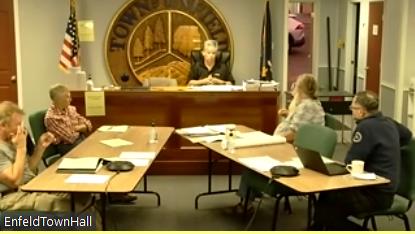
“I do believe it is something we should consider,” the Supervisor answered Carpenter that night, raising the prospect of zoning. “I will add it as a discussion point for the (Town Board’s June 8th) agenda.” Redmond did.
Ever since then—at Town Board meetings in June, July and August, as well as during an hour-long Planning Board roundabout August third—Enfield’s Supervisor has found herself mired in a tortured love-hate relationship with that dreaded, politically volatile “Z-Word.”
“I am not a proponent of zoning. I am not pushing zoning out of the blue. That is not happening,” Redmond insisted during the waning moments of our August 10 all-too-long Town Board land use discussion. “The Planning Board asked us to review this.” (Well, kinda’.). “That’s what we’re doing.”
But earlier in the same hour, the Supervisor greeted the Z-Word far more obligingly.
“I don’t want to take zoning off of the table completely as a non-option,” the Supervisor made known, as the land use discussion got rolling, “because it’s like medications. You want to be able to have all of your options available and not say, ‘hey, don’t use that one because it’s unpopular.’ You want to have all your options available and use the best medication for your situation.”
Before one criticizes Stephanie Redmond too much, remember a truth about representational democracy. Our Supervisor is an elected public officer, chosen by the voters to administer Enfield and to preside at our meetings. She holds one of five seats on our Town Board; and casts one vote—just one. Her opinions hold as much validity and deserve as much respect as mine or anyone else’s. None of us holds a monopoly on “right.” Of course, Redmond, like the rest of us, remains answerable to the voters and serves at their pleasure. Stephanie and I each face reelection next year.
Still, make no mistake. Supervisor Redmond, and no one else elected or appointed in Enfield, has done more of late to fuel the fire toward restricting how we, the residents of this town, may employ the property we own. This is her baby. And Redmond has led the debate at each of our summertime Town Board meetings. If a first-ever zoning law emerges from any of this, our Supervisor will be its architect. Were she suddenly to veer in some other direction, talk of controlled development would most likely wither on the vine.
“We are going to be getting housing developments,” Redmond predicted at our most recent August session. “We’ve seen this move through in Trumansburg and through Ithaca and what not. And eventually, inevitably we probably will see some sort of large housing development. What do we want the density to be? What sort of green space [do] we want? What sort of regulation [do] we want? And also we want to protect our aquifer….”

Through a decidedly Trumansburg-centric lens, Supervisor Redmond has drawn her gaze to T-Burg’s South Street and the nearly 80-unit Village Grove/Crescent Way mixed use development Ithaca Neighborhood Housing Services has shepherded there. Village Grove, in part, would crowd 46 rental units into a two-story building serviced by an elevator. The South Street development has not gone over well with some T-Burg locals. Reading old stories during the project’s five year review, one senses a Not-In-My-Back-Yard-centered resistance. But parochial controversy aside, the South Street project, to Redmond, presages some comparable development coming soon to a sleepy Enfield road near you.
“Colorado-west is burning…. Coastal cities are flooding. The Midwest is flooding. They’re getting large windstorms and hurricanes all over. And the reality is this is one of the safest places to live,” Redmond told us August tenth. “I do think we will continue to face development pressure in the future, and I am concerned what that means.”
The Supervisor urged we talk with Trumansburg village officials, currently mired knee-deep in a rewrite of their zoning law, much of it motivated by their South Street challenge.
“It doesn’t hurt,” I told the Supervisor, “But you know, Enfield would kill for a $75 Million City Centre or a Harold’s Square.” Both are pricey, Ithaca high-rise housing projects. “But we’re not going to get it. For one thing, we don’t have public water. We don’t have public sewer. So you’re not going to get an 80-unit apartment complex in one place because you can’t get the water to it and you can’t take care of the waste. So I don’t think that’s likely to come here… We don’t have the infrastructure for it.”
Our Supervisor was not dissuaded. “I think these are things we need to take to task early-on as a Town Board and as a Planning Board to think about what development will look like here and how we can protect ourselves from things that we may not want here…”
The Supervisor’s words tell us much. The Enfield of her vision would be a controlled community we have never seen, and one I believe many of us never want. Whether you call its enforcement tool zoning or whether you call it Donald Duck, Big Government would micro-manage private decision-making whenever five Board members deemed it wise to do so. Control might begin only modestly, but then grow incrementally, exponentially over time. And it would not just be what gets built, but also who gets to build it.
“I don’t want to encourage gentrification,” Redmond opined before the Board. “I don’t want to price our low-income residents out. So I want to avoid any sort of ordinances or regulations that would encourage gentrification in that sense….”
My response to that comment was straightforward.
“My perspective is we don’t have a problem in Enfield with runaway growth. We have a problem in Enfield with not enough growth. That’s my perspective. And I, frankly, would not try to dissuade $700,000 homes coming into this Town. It would help our tax base immensely.”
“I don’t think we want to use Trumansburg as our example,” I added. “I think it’s a bad example to use, and I’ll leave it there.”
“Why shouldn’t we use Trumansburg as an example, just out of curiosity?” asked the Supervisor.
“I don’t think it’s us.”

What did our latest merry-go-round ride accomplish? We, the Town Board, engrained through verbal repetition five supposed perversities of progress to target for future, tighter regulation: 1) Protecting Enfield from a landfill; 2) Limiting the number and location of solar farms; 3) Regulating housing developments; 4) Keeping out “loud and noxious industries;” and 5) Regulating large commercial development.
These, for lack of something better to call them, are the “Redmond Five.” Our Supervisor would bask in the comfort of thinking that we, the Town Board, set these points of control by consensus. But no, we did not. These, truly, are Redmond’s choices. The Supervisor ran the meeting. She dominated the narrative. Our Board took no vote. Some members contributed little to the conversation. Just remember, our Supervisor is always entitled to her opinion.
“We’ve put a lot of things on the table, and it would be very hard for the Planning Board to address all of them all at one time,” Councilperson Jude Lemke wisely added at our August session, recognizing that demanding too much of our Planning Board Chair Dan Walker would leave him and his Board overwhelmed and bewildered.
Redmond agreed. She gave Walker marching orders to focus for now on landfill prohibition, limiting noxious industries, and regulating large commercial development. Solar farms and housing, she concluded, could wait.
Mind you, I don’t want a landfill, either. Nonetheless, I doubt one will come here, not even for just Tompkins County’s trash. First off, Enfield’s location and topography doesn’t lend itself to a mammoth dump akin to Mount Trashmore. And secondly, face it, if New York State wants to site a regional landfill in our town, it will do it regardless of our preference and pre-empt any local law that gets in its way.

What’s more, I told the Board, “A zoning law won’t necessarily prevent you from having a landfill in our Town. What it will do is it will say where that landfill has to go. And that’s a problem. Because where are you going to put it? Black Oak Road? I don’t think so. And I certainly don’t want it across from my house. And I don’t think anybody wants it anywhere in Enfield. And so I don’t know whether a zoning law is the best way to approach these kinds of things that you don’t want anywhere.”
I analogized our Town’s best approach to that of a radio-oncologist out to kill a tumor. “And he points the laser beam right at that tumor. He doesn’t point it at the whole body, because it would kill the whole body. “
“If we think that there’s a real problem with a landfill, we should focus on the landfill. If we think there’s a problem with noxious industries, we should focus on that. I think that the best way we approach it right now is that we identify a particular problem and go after it with the best regulation we can.”
Those who think they can regulate a community’s land use can easily take the next leap and attempt to construct a commercial economy to wrap around it.
“I’d really like to see our Main Street revitalized,” Redmond told Walker and the Board. She suggested adding a laundry for those at the mobile home park. And there could be “a small café, where people can meet and have coffee and a little diner food… or some fresh produce available. I’d love to see that along our Main Street,” the Supervisor said.
I know; first question: Where is Main Street? Is it Route 79, where two stores masquerade as a commercial strip? Or is it fronting the cluster of homes in Enfield Center?
But more to the point: A central planner would like us to think she can wave her wand and a Café d’Enfield suddenly opens. It doesn’t work that way. No local law or regulation prevents a diner or carwash from coming our way right now. The limitation is the economy. Somebody someplace, no doubt, has already crunched the numbers and concluded a Denny’s or a Dunkin couldn’t survive here, unless, of course, government subsidizes them. People are too few; commerce too lean. Reality proves my point. Enfield needs to grow.
“Developing ‘Enfield Main’ is an interesting idea. I think that’s a pretty big thing to bite off right now,” Lemke remarked, putting Downtown Revitalization politely to bed for the evening.
****
As the Supervisor looked toward Trumansburg Village for land use guidance, I recited planner Carpenter’s early-August concerns about tightly-zoned Ulysses within which T-Burg sits. At that point, our exchange took a curious—and sadly, unfortunate—turn:
Supervisor Redmond: “I just want to make it clear, Robert, that we’re not looking to actually implement these. We are merely in a fact-finding mission here. This is what we’re doing. We are educating ourselves. We’re not saying we’re going to do this. We’re not saying we’re going to implement zoning; that we’re going to implement land use regulations. We’re seeing what’s out there. What’s the information? What do we want? What can we use? What should we definitely not do? We can learn from Ulysses. That’s over-regulation. That’s a problem. We can learn from these different…. But if you don’t know; if you just sit there ignorant and whine, you cannot make an enlightened, wise decision about how you want development to go….”
Councilperson Lynch: “I’m not ignorant. And I am not whining. What I am is reflecting on 50 years of observing and covering municipal government as a journalist, as a citizen of this community. And I know these are the conversations that get your head inside the tent. And pretty soon you’ve got a zoning law. And it’s a zoning law that people don’t want. And that’s my fear is that we are putting our head in the tent tonight. And I’ll leave it there.”
Redmond: “That was the best decision; is just not to get the information?”
Lynch: “Let the Planning Board design and write a Site Plan Review Law. And then we as a Town Board can review it before we adopt it….”
Our Planning Board meets September seventh. The Town Board convenes a week later. Please leave your gas can at home.
###
September 2022 News Briefs:
Whoa! New Route 79 Speed Limit.
(Sept. 19): NY Route 79, Mecklenburg Road, through Miller’s Corners just got safer.
In response to the Town of Enfield’s request, the New York State Department of Transportation has lowered the posted speed limit along a two-mile stretch of the highway from 50 to 45 Miles per Hour.

Town Board members welcomed the NYSDOT’s decision at their September 14th monthly meeting. And by the following weekend, the new lower speed limit signs between Applegate Road and Podunk Road had already been posted. Expect enforcement to follow.
In some instances, workers attach red flags to the signs to warn motorists of the change. Here they did not. So take care to notice… and to remember.
Unfortunately, the State DOT did not grant the Town Supervisor’s second request, namely to install a sidewalk between the Sandy Creek Mobile Home Park and Miller’s Corners businesses. So if the Town wants sidewalks, Enfield will have to build them itself. / RL

